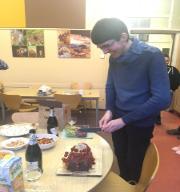VIVA success for Nardus Mollentze
Published: 23 February 2018
We are pleased to announce that Nardus Mollentze successfully defended his thesis on Wednesday 7th February.

We are pleased to announce that Nardus Mollentze successfully defended his thesis on Wednesday 7th February. Nardus has been working with Dr Roman Biek , Dr Katie Hampson, Dr Daniel Streicker and Dr Pablo Murcia since 2013 when he joined the Institute of Biodiversity, Animal Health and Comparative Medicine from South Africa through the Lord Kelvin Adam Smith (LKAS) PhD scholarship programme.
Professor Dan Haydon and Dr Ben Longdon from University of Exeter examined his thesis “Rabies virus emergence in novel hosts: from molecules to landscapes”. Here, Nardus gives us a short summary of the key findings from his research.
The invasion of novel host species by pathogens is one of the main causes of pandemics and emerging diseases. Such host shifts are difficult to anticipate, in part because we lack an understanding of the barriers that prevent maintenance of pathogens by multiple species.
My thesis describes investigations of the determinants of host shifts and host specialisation across multiple scales of organisation, using rabies virus as a model. A meta-analysis of cross-species infection studies showed evidence for a reduction in infectivity as the body temperature difference between the original and inoculated species increases.
At the molecular level, whole genome sequencing of samples from a system in which rabies virus has made an unusual host shift to kudu antelope suggests involvement of a single amino acid change involved in receptor-binding. At the cellular level, the kudu-associated viruses show increased infectivity to a bovid cell line compared to canid-associated viruses. The kudu-associated viruses also show decreased infectivity to a canid cell line representing the original host species. Combined, these results point to a new model for the host adaptation of rabies virus, and will also allow better predictions of which host shifts are likely to be successful in general.
Congratulations Dr Nardus Mollentze! Nardus will be joining The Centre for Virus Research (CVR) as post-doc with Daniel Streicker. We wish you all the best for the future.
Relevant Publication:
Nardus Mollentze, Roman Biek, Daniel G Streicker (2014). The role of viral evolution in rabies host shifts and emergence. Current Opinion in Virology, Volume 8, Pages 68-72. doi.org/10.1016/j.coviro.2014.07.004
First published: 23 February 2018

